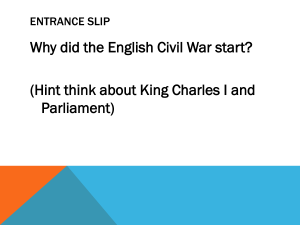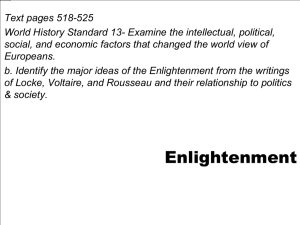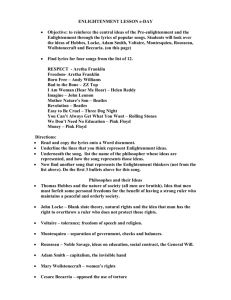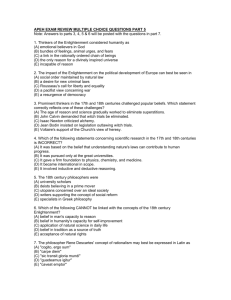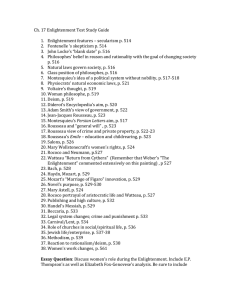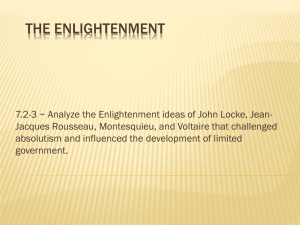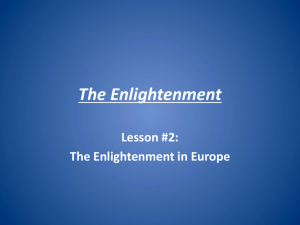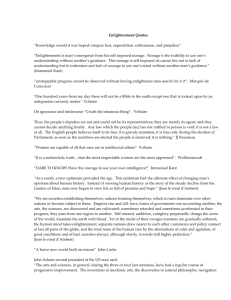World History Chapter 5 On-line Study Guide
advertisement
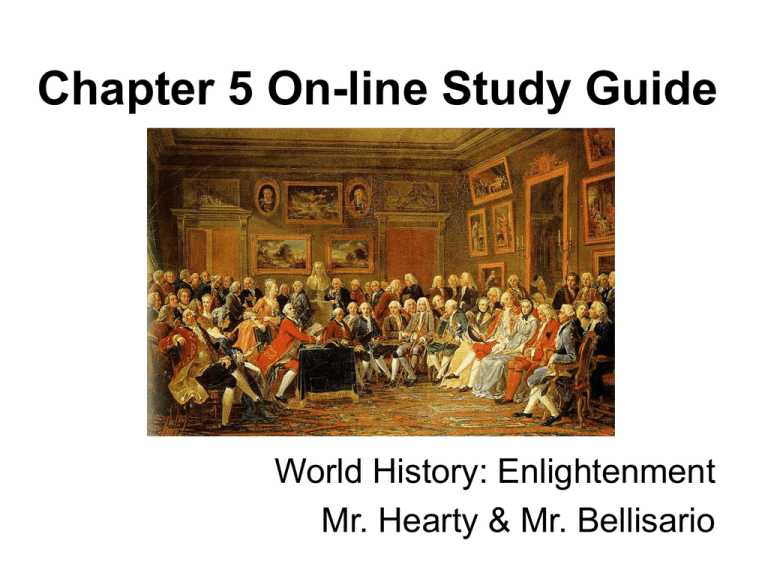
Chapter 5 On-line Study Guide World History: Enlightenment Mr. Hearty & Mr. Bellisario PEOPLE Theory of Natural Human “The first man who had fenced in a piece of land, said "This is mine," and found people naïve enough to believe him, that man was the true founder of civil society. From how many crimes, wars, and murders, from how many horrors and misfortunes might not any one have saved mankind, by pulling up the stakes, or filling up the ditch, and crying to his fellows: Beware of listening to this impostor; you are undone if you once forget that the fruits of the earth belong to us all, and the earth itself to nobody.” — Jean-Jacques Rousseau, Discourse on Inequality, 1754 PEOPLE 1. Who wrote that people have a natural right to overthrow a government that violates their rights. • Voltaire • John Locke • Adam Smith Your Correct, please click here to move to the next question. PEOPLE 2. This economist argued for a free market in which businesses could operate with few government rules. • Voltaire • John Locke • Adam Smith Your Correct, please click here to move to the next question. PEOPLE 3. French enlightenment writer who defended freedom of speech and was later exiled. • Voltaire • John Locke • Adam Smith Your Correct, please click here to move to the next question. PEOPLE 4. Author of the pamphlet, Common Sense • Jean-Jacques Rousseau • Thomas Paine • Mary Wollstonecraft Your Correct, please click here to move to the next question. PEOPLE 5. This British writer believed once women are educated, they should be allowed to participate in government. • Jean-Jacques Rousseau • Thomas Paine • Mary Wollstonecraft Your Correct, please click here to move to the next question. PEOPLE 6. In her book, A Vindication of the Rights of Woman, Mary Wollstonecraft argued that women and men should have equal… • Property Rights. • Voting Rights. • Education. Your Correct, please click here to move to the next question. PEOPLE 7. Believed people were naturally good, but corrupted because of unequal wealth. • Jean-Jacques Rousseau • Thomas Paine • Mary Wollstonecraft Your Correct, please click here to move to the next question. PEOPLE 8. Composed religious works for organ and choir • Ludwig van Beethoven • Johann Sebastian Bach • Amadeus Mozart Your Correct, please click here to move to the next question. PEOPLE 9. What idea of Baron de Montesquieu influenced the United States Constitution? • Separation of powers • Freedom of press • Federal Republic Your Correct, please click here to move to the next question. GROUPS GROUPS 10. A group of rulers who accepted Enlightenment ideas and brought about reforms to their nations. • Absolute Monarchs • Enlightened Senators • Enlightened Despots Your Correct, please click here to move to the next question. GROUPS 11. Which statement best describes enlightenment despots of the 1700s? • They allowed elected assemblies to rule their lands. • They allowed their subjects to sign social contracts. • They kept absolute power for themselves. Your Correct, please click here to move to the next question. GROUPS 12. A group of thinkers who focused on economic reforms. • Mercanocrats • Physiocrats • Turgotcrats Your Correct, please click here to move to the next question. GROUPS 13. How did the French and Indian War lead to colonists’ dissatisfaction • The British defeat led to greater French influence in America. • Colonist had to pay higher taxes for the war. • Ways of life in the Northern and Southern colonies began to differ. Your Correct, please click here to move to the next question. EVENTS & PLACES EVENTS & PLACES 14. A gathering where people could exchange ideas during the Enlightenment • Ingot • Tavern • Salon Your Correct, please click here to move to the next question. EVENTS & PLACES 15. This document outlined colonists grievances against England? • Declaration of the Rights of man • Declaration of Independence • Bill of Rights Your Correct, please click here to move to the next question. EVENTS & PLACES 16. The Battle of Saratoga marked a turning point in the American Revolution because… • It was the first American defeat in the war. • It caused the British to sign the Treaty of Paris • The American victory convinced France to support the Revolution. Your Correct, please click here to move to the next question. GENERAL TERMS GENERAL TERMS 17. Allowing business to operate with little government interference? • Laissez Passer • Laissez-Faire • Detestable principe Your Correct, please click here to move to the next question. GENERAL TERMS 18. Rules discovered by the use of reason? • Natural Law • Common Law • General Law Your Correct, please click here to move to the next question. GENERAL TERMS 19. An agreement where people give up their natural state of an organized society • Social Contract • Contract with Democracy • Common Contract Your Correct, please click here to move to the next question. GENERAL TERMS 20. An idea that government power comes from the people. • Monarchy Manifesto • Popular Sovereignty • Cannon Law Your Correct, please click here to move to the next question. GENERAL TERMS 21. A type of government created by the Constitution. • Federal Republic • Absolute Monarchy • Theocracy Your Correct, please click here to move to the next question. GENERAL TERMS 22. A grand and complex artistic style during Louis XIV’s rule. • Sachs • Baroque • Expressionist Your Correct, please click here to move to the next question. GENERAL TERMS 23. An act of restricting people from hearing or reading about new ideas or new information. • Freedom of speech • Sovereignty • Censorship Your Correct, please click here to move to the next question. GENERAL TERMS 24. How did the Scientific Revolution lead to the Enlightenment? • It encouraged people to use reason to try to understand social, political, and economic issues. • It gave monarchs more power. • It extended the natural rights of European citizens. Your Correct, please click here to move to the next question. GENERAL TERMS 25. Influential opponents of the Enlightenment included… • The Philosophes • Defoe and Haydn • Church Authorities Your Correct, please click here to move to the extended response questions. EXTENDED RESPONSE EXTENDED RESPONSE #1 Compare and contrast Thomas Hobbes and John Locke? (MUST USE CHART) EXTENDED RESPONSE #1 Create a chart that looks like this • Write the comparisons of Hobbes and Locke in the “Common Ideas” column. • Write the contrasting ideas in the Hobbes and Locke columns. EXTENDED RESPONSE #2 Compare and contrast Voltaire and Mary Wollstonecraft? (MUST USE VENNDIAGRAM) EXTENDED RESPONSE #2 Create a venn-diagram that looks like this • Write the comparisons of Wollstronecraft and Voltaire in the middle, half circle areas. • Write the contrasting ideas in the Wollstronecraft and Voltaire in the outside half circle areas. Please Try Again, Click here to return to the questions
